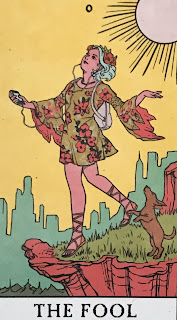Shame, Part 1: The Devil Inside
“Which is the most universal human characteristic: Fear or laziness?”
Waking Life, Richard Linklater, 2001
Throughout my life, I’ve been accused by certain relatives of laziness. They may well be right. I have a tendency to procrastinate, to choose comfort over exertion. But in my mind, the answer to the above question is, unequivocally, fear. In my mind, all laziness stems from fear, and in my case, fear of failure due to fear of rejection. As a lifelong would-be perfectionist raised by would-be perfectionists, I don’t believe my disability is autism or ADHD (that’s another post for another time). In fact, I would boldly argue that fear is perhaps the most debilitating disease in all of humanity. It's what keeps us stuck at square one over and over, forever in the first stage of the Fool's journey.
The above image is the Fool Card from the Modern Witch Tarot deck (Lisa Sterle, 2019). As we can see, the Fool isn’t consumed with worry. (If anything, she needs to open her damn eyes so she doesn’t go careening off that cliff!) She isn’t afraid of making mistakes. She’s radiant, enthusiastic, and eager to follow her new path. The Fool in reverse is an all-too common occurrence in my life. It’s happened too many times to count. I begin a new job, a new opportunity, a new undertaking with an exuberance not unlike the Fool in the card—only to end up in reverse due to my crippling perfectionism. This leads to rumination, then procrastination, then panic, incompletion, and finally, exhaustion.
And what causes the perfectionism?
Shame.
That’s been a buzzword for a few years now. Social media has developed notoriety for its shame culture. With sensationalism just a click away, it’s become a feeding frenzy. This politician said something stupid. That televangelist got caught having an affair. This celebrity said something racist. And on it goes. It’s become popular for the masses to dogpile others for doing or even saying something scandalous. While the aforementioned scenarios may be scorn-worthy, it seems we’ve hit an all-time high of outrage culture.
Of course, shame is nothing new. The mob mentality just looks different these days from how it did a hundred years ago. It’s not surprising that shame culture is born of a society of—well, shame. We’re experts at recognizing shame from a very early age. We quickly grasp which actions or behaviors are praised or frowned upon. Whether it’s fashion, musical taste, political views, or worldview, there is criticism, and there is shame.
I’ve been plagued with shame my whole life. Shame is a major factor in my ability to act and express myself. I can’t remember a time in my life when I didn’t have a sense of shame. One of my earliest memories takes me back to the age of two, crying because I couldn’t figure out how to sharpen a crayon like my mother showed me. The perfectionism didn’t improve throughout my life. I have random memories of obsessive-compulsive tics that I developed as a child, some of which persist to this day. It seems I learned very early on that if I made a mistake, I was “bad.” And truthfully, given my chaotic family environment (in varying degrees of repression and neurosis), it’s only natural that I would develop such a crippling sense of inferiority, tempered with the occasional outburst and the exceptionally rare day of joy and inspiration.
I have a severely harsh inner critic, fostered by an unholy trinity of fundamentalist guilt, histrionic family relations, and a skin so thin that I absorbed the ruthless taunts of my peers. Shame is a staple of conservative religion. (Don’t worry, conservatives, I’m not picking on you. Progressives have their own brand of self-righteousness. But that, too, is another entry for another day.) From infancy, devotees to the Catholic and conservative Protestant churches are imbued with the doctrine of original sin—the idea that every human ever born is sinful from their moment of birth, and deserving of eternal conscious punishment.
So we’re caught up in a tangle of neurotic, self-loathing, smug superiority. It’s ugly. But sadly, I would have to argue that society at large isn’t a major improvement. The constant bickering, one-upmanship, demonization, and projection—the church (and fundamentalist religion as a whole) is just, perhaps, a more extreme example. We are taught to doubt our own intuition and follow the advice of others (our elders, the media, government, educational institutions, religious leaders). Thinking outside of the box is highly discouraged. “Just be yourself!” They say. And when we do, they back-peddle. “No, not like that!”
Shame is ubiquitous in our image-obsessed world. We are held to cruelly unattainable standards that a few privileged elites hold over our heads, just out of reach, like Lucy holding the football for Charlie Brown, only to swipe it at the last second. And we keep falling for their sadistic ruse.
What will it take for us to overcome our endless fear of shame? Undoubtedly, cancel culture isn't working, as the backlash of angry voices only rises in volume and intensity. My answer comes in the next entry, where we'll be exploring the repression of the throat chakra (and a shout-out to Bill Burr).
Happy Solstice.

Comments
Post a Comment